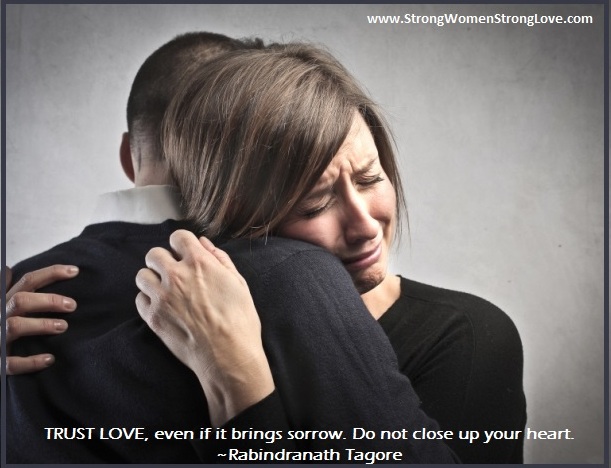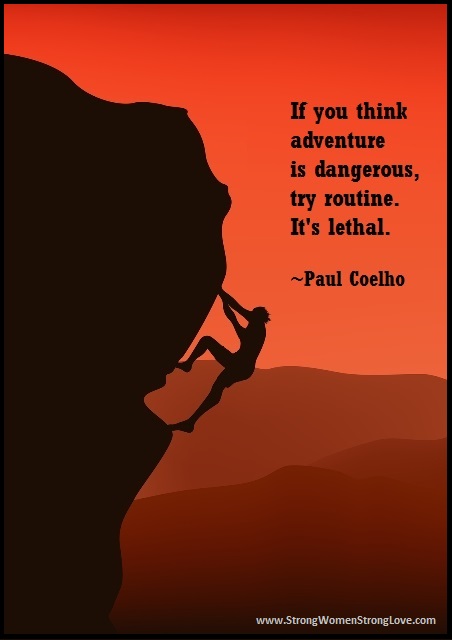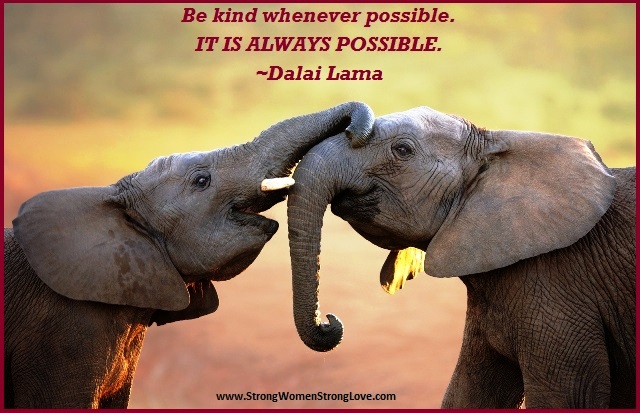by Strong Women Strong Love | Dec 9, 2013 | Passionate Partnership, Quotes |

In the following blog post from The Huffington Post, Terry Gaspard, MSW, LICSW, reveals the pivotal role of vulnerability in sustaining a marriage:
In my over 20 years of counseling couples, I’ve come to realize that vulnerability is the key to a lasting union and that shame and fear are two of the main reasons why couples get entrenched in power struggles that can lead to divorce. Opening up to our partner can make us feel vulnerable and exposed, but it is the most important ingredient of a trusting, intimate relationship. One of the biggest challenges that couples face is being vulnerable with a romantic partner. After all, with over 40 percent of adults growing up in a divorced family, healthy templates for intimacy may have been in short supply. In other cases, many of us were raised in homes where showing vulnerability was seen was a weakness.
What drives our fear of being vulnerable? Dr. Brene Brown, a distinguished author and researcher, informs us that vulnerability is often viewed as a weakness, but it’s actually a strength. In her landmark book Daring Greatly, she explains that vulnerability is the core of all emotions and feelings. She writes, “To feel is to be vulnerable. To believe that vulnerability is a weakness is to believe that feeling is a weakness. To foreclose on our emotional life out of fear that the costs will be too high is to walk away from the very thing that gives purpose and meaning to living.”
In Daring Greatly, Dr. Brown defines vulnerability as uncertainty, risk, and emotional exposure. Given this definition, the act of loving someone and allowing them to love you may be the ultimate risk. Love is uncertain. It’s risky because there are no guarantees and your partner could leave you without a moment’s notice — or betray you or stop loving you. In fact, exposing your true feelings may mean that you are at greater risk for being criticized or hurt.
Continue reading at:
http://www.huffingtonpost.com/terry-gaspard-msw-licsw/relationship-vulnerability_b_3999535.html
by Strong Women Strong Love | Jul 9, 2013 | Passionate Partnership, Quotes |

Trust is built over the years, one experience at a time. That’s why it’s so painful when trust is shattered. Any time you feel betrayed, the level of trust in your partner is affected. Maybe he failed to stick up for you when your mother-in-law criticized you. Perhaps, he made a nasty comment in the middle of a fight. Or, worst case scenario, you discovered that he is involved with someone else.
Once you have been hurt, you have to evaluate whether it is worth your while to rebuild trust. If your partner has a long history of betraying you, you may need to give serious thought to whether things will ever change. However, when the transgressions are relatively minor and infrequent, working through the hurt can actually deepen your bond.
When the betrayal is more significant, like in the case of an extramarital affair, it is important to assess whether you and your husband have enough commitment to the marriage to do the hard work of rebuilding trust. He has to have enough remorse and understanding of your pain to earn your trust back. And, at some point, you have to be willing to let go of your desire to “make him pay” for the pain he caused you. Trust can only be rebuilt with tremendous courage, commitment, and persistence by both of you.
Pain can actually serve as a motivator to tend to your relationship and keep it on track. Believe it or not, a marriage can actually end up on more solid ground when the two of you open yourselves up to learning from the sorrow you have caused one another and use it to strengthen your relationship.
by Strong Women Strong Love | Jun 15, 2013 | In the News, Passionate Partnership |
Everyone is so busy that finding time to connect with your spouse can seem difficult. Dr. Jamie Long has the following 12 suggestions for quickly connecting with your spouse:
- Daily touch
- Be curious
- Side with your partner
- Express gratitude
- Sleep naked
- Relive a memory
- Create new memories
- Listen to him or her
- Share a laugh
- Expressions of loving-kindness
- Flirt
- Turn off the electronics
To read the full article at www.PsychologyToday.com:
12 “Thirty Second” Ways to Connect with Your Spouse”
by Strong Women Strong Love | May 29, 2013 | Passionate Partnership, Quotes |

This quote by Paul Coelho got me thinking about routines and how they affect relationships. As a psychologist, I will tell you that routines are part of what keeps us sane. Given all the demands on us, some structure and predictability in our lives is absolutely necessary to keep stress at bay.
That being said, too much routine can be destructive. Relationships that last for several years often decline because they become downright boring and predictable. You go to the same places to eat. You always hang around the same people. You can even complete one another’s sentences because you’ve heard the same stories again and again.
Keeping a relationship interesting doesn’t mean you have to be spontaneous all the time, but it does require you to step outside the rut and do some things differently on occasion.
What are some of the things you do to keep your relationship interesting?
by Strong Women Strong Love | May 25, 2013 | Excerpts from Strong Women Strong Love, Passionate Partnership, Quotes |

An excerpt from Strong Women, Strong Love:
Studies across cultures identify kindness as one of the top qualities people seek in a partner. Kindness, sincerity, and warmth are essential to helping you and your partner open up to one another. Treat yourself with kindness, as if you were your own best friend. Welcome interactions with gentleness, remembering the power you have to crush a person’s spirit, even your own. We all want to feel treasured by the ones we love, so cherish your partner and let him know how much he means to you. A gentle, tender, compassionate stance in relating to your partner does wonders for nurturing authenticity because you are making it safe for both of you to be yourselves.
by Strong Women Strong Love | May 20, 2013 | Excerpts from Strong Women Strong Love, Passionate Partnership, Quotes |

An excerpt from Strong Women, Strong Love:
In a relationship, it is important to have some capacity for flexibility. There are times when you and your partner need to lean on each other, like when you are ill. Other times, you are distant from one another because you are simply busy or need space. The level of closeness can also fall somewhere between the two.
When each person in a relationship has a strong sense of self, they can move into different stances based on their needs. Movement away is not viewed as a threat, and movement toward is not considered suffocating because each person is emotionally secure, generally self-reliant, and trusting.
The two most problematic stances in a relationship are Excessively Close and Emotionally Distant. If you have a weaker sense of self, you are probably driven by fear, which makes you prone to being too close or too distant. It is difficult for you to accept the fluid nature of a relationship, so you may not allow your relationship the breathing room and intimacy necessary to grow in a healthy manner. These two stances may manifest in the ways listed below:
Excessively Close (Needy/Clingy)
- Needing constant reassurance
- Feeling intense jealousy
- Being intrusive
- Making your partner the center of your universe
- Nurturing your spouse excessively, relating more like a mom than a partner
- Acting like a victim, doormat, or helpless person
- Refusing to do anything independently of your partner
- Not knowing what you need or want
- Ignoring all other relationships
Emotionally Distant (Emotional Strangers)
- Hiding your true thoughts and feelings from your partner
- Being so independent your partner feels unnecessary in your life
- Avoiding deep connection
- Ignoring your partner’s needs
- Showing little interest in the details of your partner’s life
- Spending all your time with other people or other activities, including work
- Avoiding relationship problems that need to be addressed
If you are regularly relating to your partner in any of these ways, it is important to ask yourself what unfulfilled needs or wishes are driving you.
Although women are encouraged to make men the center of their world, men usually find this too intense and withdraw. What works better is having a life of your own that you gladly share with one another. A strong sense of self gives you the flexibility essential to a healthy relationship.






